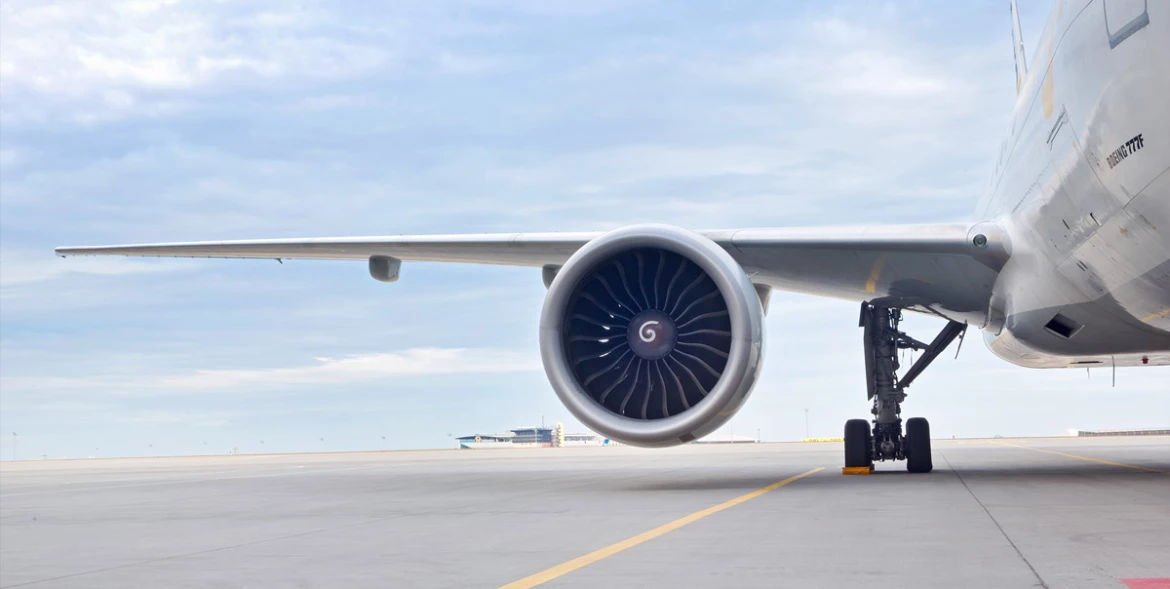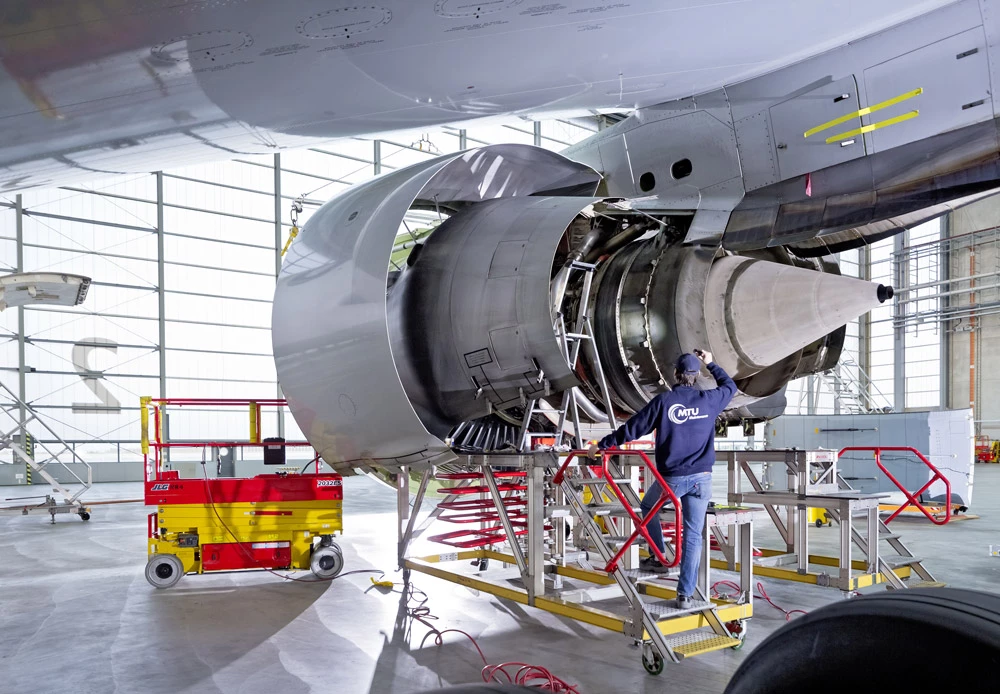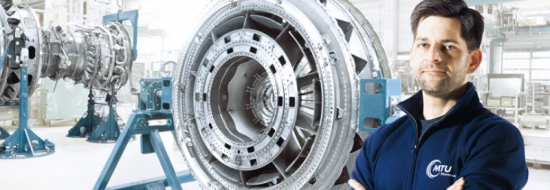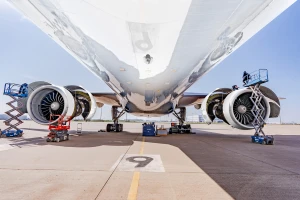people
Two of MTU’s MRO experts discuss service requirements in the freight business
The boom in online retailing is creating new trends in cargo business. Les Cronin and Luc Morvan from MTU talk about challenges and service needs of the industry.
09.2021 | author: Nicole Geffert | 5 mins reading time
author:
Nicole Geffert
has been working as a freelance journalist covering topics such as research and science, money and taxes, and education and careers since 1999.

When it comes to customized services in the realm of MRO and integrated engine leasing, these two men are the experts. They are also the ideal contacts for customers in the air freight business. And they share an unbridled enthusiasm for their job.
Luc Morvan, Head of the MTU Maintenance Lease Services office in Singapore, and Les Cronin, Senior Director of Sales, The Americas at MTU Maintenance in Atlanta, talk about trends, challenges and service requirements in the air freight business.

“In the wake of the pandemic, airlines have been phasing out certain passenger aircraft, and now major online retailers and logistics companies are increasingly buying up such aircraft, including narrowbodies.”
Senior Director of Sales, The Americas at MTU Maintenance in Atlanta
Les Cronin: Here’s an impressive statistic: in North America, the air freight business grew by 20 percent in the first half of 2021, compared to the same period in 2019. The main growth driver is the e-commerce and ring-the-doorbell consumer boom—where we now have the ability to order virtually anything to our front door within 24 hours, or even sooner, and with no more than two clicks on a smart handheld device. I can distinctly remember a stopover at a US regional airport four years ago, where I came across several white-tailed freighter aircraft and I saw how one online retailer’s packages were being unloaded and transferred at lightning speed. Clearly, this was a simulation designed to discover the most efficient way of transferring various e-commerce packages to domestic US households requiring next-day delivery. I thought to myself, this will be one of the challenges that the cargo business will face in the future as demand increases in the e-commerce market.
However, as we say, sometimes timing is everything: the advent of the coronavirus pandemic has resulted in a boom in e-commerce for these online retailers, changing consumers’ habits forevermore. This highlights the importance for these online retailers and logistics companies to ensure a smooth, efficient, fast supply chain directly from the factory or the distribution mega warehouse all the way to their customers’ front door. That in turn presents a unique opportunity for growth in the air cargo market, both today and in the future. This is a market where we were uniquely well positioned pre-coronavirus pandemic to offer support.
The services we provide must be tailored, responsive, flexible and reliable to meet the needs of our global cargo customers. Take our engine maintenance business: no matter whether we’re repairing a customer’s engine in the field (on-wing or off-near-wing) or restoring performance in one of our facilities globally, we must be able to consistently perform each and every time to the highest level of service, which means with quality and reliability, on budget and on time. Now, with the cargo market becoming ever more retail consumer centric and time-pressured, we must remain dynamic and work even more efficiently to meet our customers’ needs and requirements.

“Whether you’re a cargo operator introducing a new aircraft type into your fleet or a passenger operator entering the cargo market, we have a dedicated product to support you on your journey.”
Head of the MTU Maintenance Lease Services office in Singapore
Luc Morvan: Yes, and we make a point of getting our teams on-site quickly because for us, customer proximity is key. That’s one of the benefits of working with us. Because we maintain a global presence, we’re strongly positioned regionally and locally. It allows us to offer our customers efficient and direct support as well as customized MRO solutions. This has proven invaluable during the pandemic and the associated restrictions on international travel. Our latest MTU Maintenance offices in Singapore, Dubai and Dublin reinforce this global yet local presence for aircraft lessors even further—and that’s good for our cargo customers, too, giving them easier access to our top-rate service solutions for both the widebodies and narrowbodies in their fleets. The latter are gaining popularity in the freight business, too.
Les Cronin: We’re also seeing this trend in North America. In the wake of the pandemic, airlines have been phasing out certain passenger aircraft, and now major online retailers and logistics companies are increasingly buying up such aircraft, including narrowbodies. At the moment, we’re reading about transactions like this pretty much every week, with cargo conversion slots being booked out years in advance both by the operators and by leasing companies. These decommissioned jets are converted by specialist companies and start a new life as freighters, which normally extends their life well beyond their passenger operational life.
Luc Morvan: Some customers who mostly use widebodies to transport freight are now adding narrowbodies to their fleets so that they can serve short- and medium-haul routes efficiently as well. These narrowbodies are powered by engines that the customer may not be all that familiar with. Here, too, we’re best placed to advise them thanks to our in-depth knowledge and experience in a wide array of engine types—from the GE90 and CF6-80 for widebodies to the CFM56 engine family and the V2500 for narrowbodies, to name but a few. Not to mention the PW2000, which has been powering freighters for decades.
Les Cronin: That brings a short anecdote to mind. Some time ago, I was visiting a cargo customer and as we were talking, he led me over to the panorama window in his boardroom. Then he pointed at a Boeing 767-200F that was sitting on the ramp and he proudly informed me that “This aircraft is unstoppable: it’s been in service for 37 years and is still doing an outstanding job—we tried to retire her, but she’s still in constant and great demand with our customers.” I think this is a true testament to the fact that the tailored MRO services MTU offers its customers mean they can keep their fleets flying year after year.

On-site-services: With the aim of ensuring continued operations, MTU develops customized solutions and is available 24/7 for its freight customers.
The CF6 engine is a prime example of this, having just celebrated its 50th year of operation. MTU has been developing and manufacturing parts for this engine since 1971 and maintaining this engine since 1979, when it was first used to power the Airbus A300, McDonnell Douglas DC10 and Boeing 747. It later powered the Airbus A310, Airbus A330, Boeing 767 and McDonnell Douglas MD11 aircraft types—and production still continues today for the new Boeing 767-300F. Our customers can rest assured that we’ll be maintaining the CF6-80 family well into the next decade and beyond for global cargo customers so they can meet the essential delivery needs of their B2B and e-commerce consumers.
Luc Morvan: We’ve actually developed alternative MRO solutions for those customers that operate older engines. These include smart repairs and the use of used serviceable material (USM)—and let’s not forget engine leasing. Leasing is very common in the cargo business. Since MTU Maintenance Lease Services is also a lessor, we know the specific mission profiles. What’s more, we specialize in technical asset management and offer our customers comprehensive support for their fleets—at any hour of the day or night, of course, because our customers also work around the clock. Whether you’re a cargo operator introducing a new aircraft type into your fleet or a passenger operator entering the cargo market, we have a dedicated product to support you on your journey.








